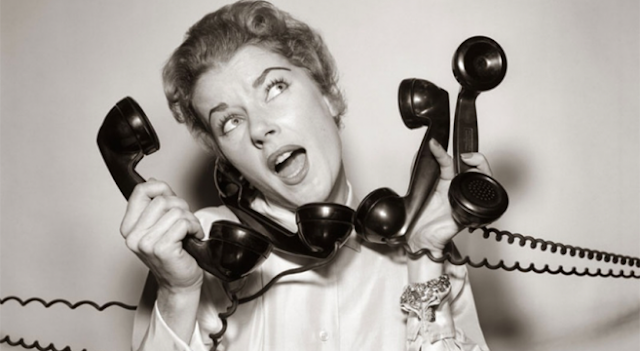Event Publicity & PR: How Not to Go Crazy Series
As promised, I am back with info on the series "Event Marketing". I am starting with what seems to be the ultimate hair - tearing, coronary - causing, maniacal element of any major event -- Event PR/Publicity. Event PR assumes a life of its own -- sometimes it is bigger than the actual event (oh yes, especially if you are also managing an agency -- and that is why, coronary-causing).
Source: https://ouimpressions.files.wordpress.com/2015/03/eventatriumpeople.jpg
So at this point of time, when your event is fleshed out and the finer details are in print, you can start with the following:
1. Do You Need PR or Do You Need PR?
But wait -- we need to answer this question! Do you need PR? Of course yes! If you care about attendees, if you care about (and you are answerable to) sponsors, and if you do not wish to relegate your event to event - hell. (Not to say that doing PR might prevent that). But on a serious note, PR can help you with the hard deliverables for your event -- press releases (before and after the event), press coverage/conference (with key sponsors/attendees), media interviews, opinion pieces, the works.
Publicity & PR will help build the profile of the event, will act as a solid credentials statement for next year and provide sponsors a hugely tangible value addition (For instance, if they were to hire an agency on their own vs their securing press coverage through participation in an event: helps in presenting a strong case for sponsorships!)
2. Get Your Positioning & Messaging Right
So what is the event positioning? Is it an invite - only CTO - only event? Or is it a consumer event? The event positioning defines everything -- starting with the messaging and ending with the choice of media vehicles. If it is a exclusive event (lucky you!), you can play on the premium-ness of the event and design the right mix for PR (limited edition pull outs, opinion articles introducing the event, spokesperson interviews) and if it is a consumer event, then the program needs a high-octane sustained marketing assault. You have to work on creating "suspense" and "excitement" to keep the momentum going. Any break/dip in the communication cycle could turn off potential attendees and participants. A lot is governed by the format of the event, the event span (number of months through which the event is planned & executed) and the event budget.
3. Budget
Ha, this should have been the first one on the block. Budget, haves: good. Budget have-nots: welcome. This offers you the scope to be innovative, crafty and cunning. Because this is going to give you first hand experience about event PR like no other. But first, decide how much you want to spend on event publicity & PR. Decide if you want to do it in-house or through an agency. No recommendations here -- but only one word of advice: if you can do it on your own, be prepared for a rough ride, especially if it is your first time and your event is a big format event. If you want to do it in-house, experiment first with a small-format (read manageable event). Else call in the professionals.
4. Your Stories
No agency that I have worked with has ever done it solo -- you HAVE to provide them the wings to fly. That means the stories -- what do you want covered, what do you want the storylines to be? Whom do you want to be featured? What do you think will be newsworthy? Remember, every story needs a "hook". Find your hooks and keep on finding them and placing them appropriately within your stories. Latch onto current trending topics and try to see if you can add value to the conversations by placing your hook. And -- its not going to be easy. Hence, hair - tearing!
5. Find Your Spokesperson
If you are blessed with media savvy spokesperson/s, OMG awesome! If not, again, no worries. Find/research/search about media training, FAQs, training documents, interview pointers and help your spokesperson/s.
6. Media Kits
Who knows about your event? Why would they care? Prepare a complete backgrounder - company profile, event profile, who are attending, why are they attending, is it the first time, leadership profile. Don't presume the press would know. Being over - communicative helps.
7. Design Your Tactical Plan
What is your ideal mix? Press releases? Press conference? Comments on other pieces? Online? Print? Get to brainstorm on your mix prior to kicking off the PR engagement. Once your event PR engagement starts, utilize that time for action or execution. And your strategy should govern/precede that (read, pre-engagement work).
If hiring an agency, look for passion and hunger. I've found these two have always outweighed every other credential. Having worked with big ticket marquee names and smaller agile nimble footed agencies, I would suggest find the one that is as invested in your event as you, chases you relentlessly and takes over your event as his own as soon as you shortlist them.
In the end, nothing is ever going to prepare you for crisis management, except perhaps crisis itself. So, even though that is the case, please sound your team about potential crisis areas and set up a preliminary crisis management response template.
And remember, if it wasn't crazy -- it won't be marketing! Watch out for the super-smashing slide deck for this post on Event Publicity & PR. Coming up soon!
PS: This article has no references -- this is predominantly experience driven (and my limited experience at that). Reader comments most welcome -- any one who wishes to take this offline for inputs/helps please do write to blogbox24x7@gmail.com. Cheers and have a nice day!




Comments
Post a Comment